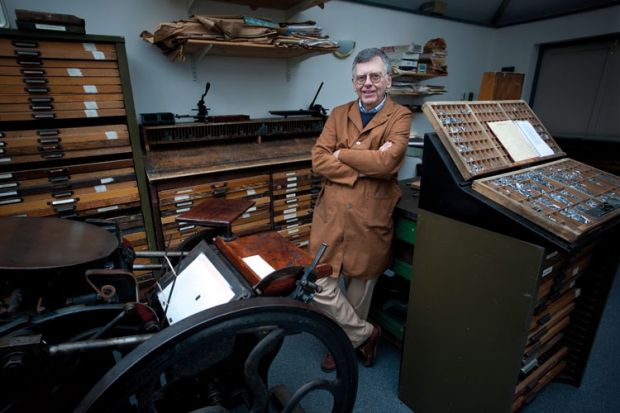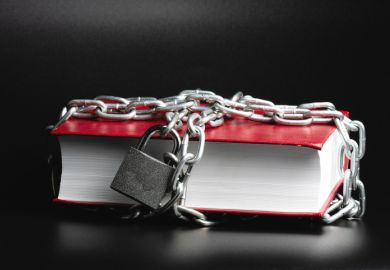Source: Brian Harris
There was a moment in the 1980s, recalls James “Chip” Coakley, when “an exodus from letterpress meant that publishers could get more from selling off their type than using it”. Since Coakley, a former lecturer in Syriac (a language once spoken across much of the Middle East), had already learned basic printing skills at the Cambridge University Library, he grabbed the chance to snap up “a quarter of a tonne of Syriac type” to start his own small private press: Jericho Press. As this owns a Vandercook 4 proofing press and an Arab treadle platen, Coakley can do much of his own setting and all his own printing. He averages around a book a year, mainly of a broadly academic kind, although some just “seemed useful and appealing”.
The list of publications produced by the press covers the areas of Coakley’s scholarly interests while also including devotional material, studies in typography and a “bestiary” by Thomas Heyrick, whose poetry had not been reprinted since 1691. A book titled In Praise of Ely, illustrated with woodcuts and on sale in local bookshops, is a translation of a Latin text written by a 12th-century monk.
Coakley, who works with manuscripts at Cambridge University Library and Soas, University of London, sees his printing activities as “a hobby less expensive than joining a golf club” – and there is certainly little prospect of making a fortune by setting up one’s own private press.
He is not alone in having done so, though, so what has motivated other academics to set up a press of their own? And can they gain any professional credit for it? In most cases, it seems to spring from a desire to produce books, written by themselves or others, whose philosophy, content or design makes them unlikely to appeal to mainstream publishers.
Commercial houses tend to be wary of shorter fiction, for example, so Nicholas Royle, senior lecturer in creative writing at Manchester Metropolitan University, set out to remedy this at Nightjar Press, producing single, usually sinister stories in “signed, limited-edition chapbooks” (pocket-sized booklets). His colleague Nikolai Duffy, senior lecturer in American literature at the university, is the founding editor of Like This Press, which focuses on “work that is formally unusual, questioning, unexpected and challenging”, including stories (“the more curious the better”) and “books-in-boxes” (“consisting, usually, of three interconnected pamphlets or two volumes collected in beautiful hand-printed boxes”).
Similarly committed to work that is “radical in its materials and form” is Veer Books, a publisher associated with Birkbeck, University of London’s Contemporary Poetics Research Centre and run by a collective currently led by William Rowe, anniversary professor of poetics in the department of Iberian and Latin American studies.
Although the time-consuming work is mostly done in the scholars’ spare time, he says, the results are still included in the research excellence framework.
More conventional forms of book are issued by Caroline Jaine, who describes herself as juggling several careers – “one of which is as an academic”. Jaine teaches at London Metropolitan University, Anglia Ruskin University and Soas, mainly addressing themes such as “communications, conflict and counter-terrorism” arising out of her work as a diplomat.
In 2011, having completed a memoir, A Better Basra, she was aware that “a publisher might try and draw out the more sensational moments – like my encounter with [former foreign secretary] Margaret Beckett. I wanted it to be a gentle tale of an ordinary woman serving in Iraq.

“I also knew that the publishing path is long and tedious, and frankly out of step with the speed of my life…I decided (being a control freak) that I needed it published how I wanted it published. I ended up founding a publishing house as a result.”
This became Askance Publishing, which claims to “plug the gap between traditional publishers…and vanity publishers (who print anything and charge more than they need to)”. Titles include works of fiction, art books, an exhibition catalogue and London-based Iraqi journalist Haider Al-Safi’s academic study, Iraqi Media: From Saddam’s Propaganda to American State-Building.
Two other small publishers have built up lists based on clear and sharply contrasting ideals. Steve Braund is an enthusiastic advocate of “authorial illustration” – illustrators producing books based on texts they have written themselves – and established a pioneering MA in the subject at what is now Falmouth University. Atlantic Press was set up in 1998 to promote the same goal, although he was also keen to publish a story of his own, “based on my family background in gypsy territory” around Bodmin Moor.
The press now represents the bulk of Braund’s research – and takes up all of his free time. It has produced 22 books by different illustrators, some of them well established and some of them Braund’s MA graduates, “giving them the opportunity to do their first authorial work. They develop their own content and are given total control of text, images and design. The words have to be as strong as the pictures.”
If finances permit, Braund likes to “get the form of the book to communicate the message” – as in the case of Alys Jones’ First World War narrative Beyond the Wire, where explosions appear to have blasted through the pages: each copy of the book has more than 100 holes, cut entirely by hand, hole by hole, copy by copy. “It wasn’t viable to use singed laser cutting,” he reports. “The book has sold incredibly well – we just can’t cut them fast enough!”
A very different publishing philosophy can be found at Hafan Books, run by Tom Cheesman, reader in German at Swansea University.
Hafan means “sanctuary” in Welsh and the press was founded by Cheesman in 2003 with Eric Ngalle Charles, a refugee from Cameroon, and Sylvie Hoffmann, a retired schoolteacher of French origin, to publish an anthology, Between a Mountain and a Sea: Refugees Writing in Wales.
Although it now also publishes experimental poetry and translations of contemporary German literature, there is still a major focus on refugee writing, with the sixth anthology just out, alongside other memoirs and conversations with Holocaust survivors based in Cardiff.
Proceeds from the books go to the Swansea Bay Asylum Seekers Support Group charity, for which the press was designed to raise both awareness and money.

“The anthologies include work by Welsh as well as refugee writers as a gesture of solidarity, welcome and respect,” explains Cheesman, “so they are put in context rather than ghettoised. We are trying to spread messages of hospitality and respect, which work much better at the local than the national level. The field of action is emphatically local, which is where we can do effective work.”
Two final examples provide further evidence of the remarkable books small private presses run by academics can produce. David Jury, lecturer in typography at Anglia Ruskin, has written a number of standard introductions to typography and graphic design, as well as Letterpress: The Allure of the Handmade. He has also put his principles into practice at Fox Ash Press, which produces fine press books from his studio. He likes the sense of “complete control” the press offers him and the fact that “any restraints are self-imposed. You can always add more colours or elaboration if you are willing to put in the time.”
Yet he also stresses that “everything is driven by the text” and that he is “not interested in things that are just decorative or ornamental” for their own sake.
One Fox Ash project showcases the work of the photographer Humphrey Spender – closely associated with the Mass Observation movement – who in 1934 secured a commission to travel to Morocco. He also kept an intimate diary of the trip, which he later censored, cutting out references to youthful homosexual encounters, with an unsuccessful view to publication. To coincide with an exhibition, Fox Ash Press produced Morocco: A Desert Adventure, using an elaborate design to run the two texts side by side with evocative but previously unseen photographs.
Several years later, however, in what Jury calls “an act of joy”, he decided to create an even more elaborate edition, The Printer’s Return to Morocco, where Spender’s self-censored text is printed as a separate book, in the style of a 1935 Penguin paperback, incorporated within the same publication.
Equally striking is the work of the Distillers Press, a letterpress print workshop run by Seán Sills and based at the National College of Art and Design in Dublin, which publishes occasional books by MA students who come to work there on practice-based research projects. One of them is what Jamie Murphy, now an artist-in-residence at the press, describes as “a finely printed artist’s book”, issued in an edition of 36 copies. He came up with the idea for Albert, Ernest & the Titanic when he “stumbled across the fact that the Titanic employed onboard printers. They would have used letterpress printing, so I decided to research both the men and the technology. I wanted to convey the role of the tradesmen and the craft of letterpress, so each section has an image of the printers and then an image of the ship.”
The finished book includes 40 linocut illustrations, a technique popular at the time of the Titanic, based on “a lot of research combined with speculation”. We see the master printer Abraham “Albert” Mishellany, aged 52, leaving his house in West London, and then on board with his -year-old assistant Ernest Corbin. Since their ages were close to his father’s and his own, Murphy used his family as a model and decided that Mishellany and Corbin “worked in such proximity they would have had a father-son-like bond”.
Two small details draw out the poignancy of the story. The ink is made from coal retrieved at the wreck site. And latitude and longitude are recorded in a typeface – slowly filling with water – once used to advertise the Titanic’s return journey.
Register to continue
Why register?
- Registration is free and only takes a moment
- Once registered, you can read 3 articles a month
- Sign up for our newsletter
Subscribe
Or subscribe for unlimited access to:
- Unlimited access to news, views, insights & reviews
- Digital editions
- Digital access to THE’s university and college rankings analysis
Already registered or a current subscriber? Login





